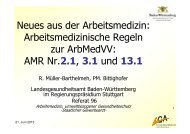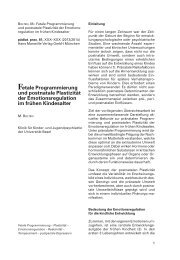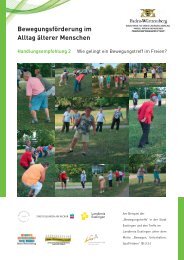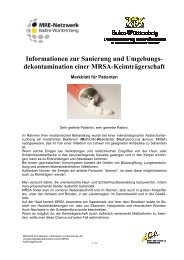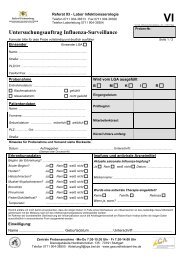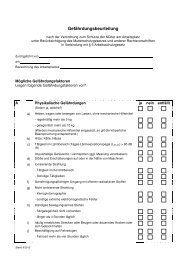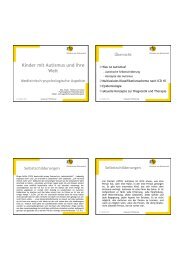FINDRISK - By answering just 8 simple questions you can
FINDRISK - By answering just 8 simple questions you can
FINDRISK - By answering just 8 simple questions you can
Create successful ePaper yourself
Turn your PDF publications into a flip-book with our unique Google optimized e-Paper software.
HealthCheck DIABETES<br />
HEALTHCHECK DIABETES - RATING YOUR<br />
DIABETES RISK (within the next 10 years*)<br />
How to reduce <strong>you</strong>r risk<br />
Already small changes in lifestyle will support <strong>you</strong>r health<br />
Below 7 points <br />
1 percent*<br />
You are hardly at risk. Special precaution or prevention<br />
is not necessary in <strong>you</strong>r case. Nevertheless it is beneficial<br />
to eat healthy food and have adequate physical<br />
activity.<br />
7 to 11 points 4 percent*<br />
Your risk for becoming a diabetic is only slightly increased.<br />
To be on the safe side, please follow these rules:<br />
• If <strong>you</strong> are overweight <strong>you</strong> should try to reduce <strong>you</strong>r<br />
body weight by 5 –7%.<br />
• Be physical active 30 minutes on at least 5 days a<br />
week so that <strong>you</strong> slightly sweat.<br />
• Fat should contribute a maximum of 30% of <strong>you</strong>r<br />
total energy intake.<br />
• The proportion of saturated fat (predominantly in<br />
animal fat) should not exceed 10% of <strong>you</strong>r energy<br />
intake.<br />
• Consume 30 grams of fibres (e.g. in whole-grain<br />
products, vegetables, fruit) per day.<br />
12 to 14 points 17 percent*<br />
If <strong>you</strong> are scored in this risk group <strong>you</strong> must not postpone<br />
preventive measures in any case. Tips from experts<br />
and instructions for changing lifestyle which <strong>you</strong> <strong>can</strong><br />
implement <strong>you</strong>rself is of help. Seek for professional<br />
support if <strong>you</strong> realize that <strong>you</strong> will not succeed this way.<br />
15 to 20 points 33 percent*<br />
Your risk is substantial. One third of all individuals with<br />
this score will become a diabetic within the next 10<br />
years. To underestimate the situation might have serious<br />
consequences. Ideally <strong>you</strong> seek for professional<br />
support. Let <strong>you</strong>r pharmacist check <strong>you</strong>r blood sugar<br />
level and visit <strong>you</strong>r GP for a health check-up.<br />
Above 20 points <br />
50 percent*<br />
There is acute need for taking action because it is absolutely<br />
possible that <strong>you</strong> already have diabetes. This is the<br />
case for about 35 percent of all individuals with a score<br />
above 20. A <strong>simple</strong> plasma glucose test – e.g. in <strong>you</strong>r<br />
pharmacy - might be helpful for additional information.<br />
But this does not replace an extensive laboratory test to<br />
exclude an already manifest diabetes. Therefore <strong>you</strong><br />
should immediately ask for an appointment with <strong>you</strong>r GP.<br />
*Risk in percent = e.g. 4% indicates that 4 out of 100 individuals with this score <strong>can</strong><br />
contract type 2 diabetes within the next 10 years.<br />
More vegetables<br />
and fruits<br />
Low<br />
fat food<br />
Low<br />
fat cooking<br />
Healthy<br />
snacks<br />
Healthy<br />
drinks<br />
Take the time<br />
Use <strong>you</strong>r way<br />
to work for<br />
physical<br />
activity<br />
Give way for<br />
the bicycle<br />
Support<br />
through group<br />
dynamics<br />
Choose the<br />
right intensity<br />
Set realistic<br />
goals<br />
Introduce<br />
action days<br />
Outwit<br />
<strong>you</strong>rself<br />
Eat and drink healthier<br />
With each meal <strong>you</strong> should consume a lot of vegetables,<br />
fruits or salad.<br />
Choose the low fat option of dairy and cheese products.<br />
Eat moderately low fat sausages and meat.<br />
You should have fish at least once a week.<br />
<strong>By</strong> using pans with non-stick coating <strong>you</strong> <strong>can</strong> reduce<br />
fat for frying considerably. Generally, rapeseed oil<br />
(for frying) and olive oil (for salads) should replace<br />
solid fats in the kitchen.<br />
Fast food and convenience food contain lots of<br />
calories. Abstain from it. Nature offers delicious<br />
snacks like carrots, apples and nuts.<br />
Avoid sugary drinks. Instead, satisfy <strong>you</strong>r thirst with<br />
mineral water, diluted fruit juices and herbal teas.<br />
More physical activity in daily life<br />
Be physical active 30 to 60 minutes daily. Choose<br />
activities which <strong>you</strong> <strong>can</strong> well integrate into <strong>you</strong>r<br />
daily life.<br />
For example waiting at the bus-stop: Contract <strong>you</strong>r<br />
gluteal and abdominal musculature alternatively.<br />
Then seesaw on <strong>you</strong>r toe tips up and down. Probably<br />
there is even enough time to walk to the<br />
next bus stop.<br />
For shopping nearby use <strong>you</strong>r bicycle. Put it in a<br />
place where <strong>you</strong> <strong>can</strong> use it anytime and keep it in<br />
good function.<br />
If <strong>you</strong> enjoy being physical active in a group - take<br />
advantage of that. Fixed training times and nice<br />
company help to stay active also in times when the<br />
motivation is low.<br />
Choose activities with low to moderate intensity.<br />
For example Nordic Walking is ideal. If <strong>you</strong> are<br />
sweating slightly and <strong>can</strong> still talk while being<br />
active, the intensity is <strong>just</strong> right.<br />
Maintain activity in the long run<br />
Goals which are not achievable make <strong>you</strong> feel bad<br />
and are discouraging.<br />
One to three times a year <strong>you</strong> should put things<br />
right and clean up radically. This should include<br />
<strong>you</strong>r fridge as well as the basement and the living<br />
room. <strong>By</strong> changing <strong>you</strong> routines that way <strong>you</strong> <strong>can</strong><br />
regain power and energy for all other areas of<br />
life.<br />
Only measures which are easy to implement are<br />
likely to persist in daily life. For example sports<br />
shoes: If <strong>you</strong> place them ready to hand in <strong>you</strong>r<br />
corridor <strong>you</strong> will also use them more often. The<br />
same is true for the food in <strong>you</strong>r fridge: Place<br />
healthy food in the front row because then <strong>you</strong><br />
will pick them first.<br />
For more information please visit:<br />
• www.diabetes-risiko.de<br />
• www.diabetesstiftung.org<br />
Copyright © Deutsche Diabetes-Stiftung FIND/1009050<br />
Deutsche Diabetes-Stiftung . Staffelseestraße 6 . 81477 München . www.diabetesstiftung.de






